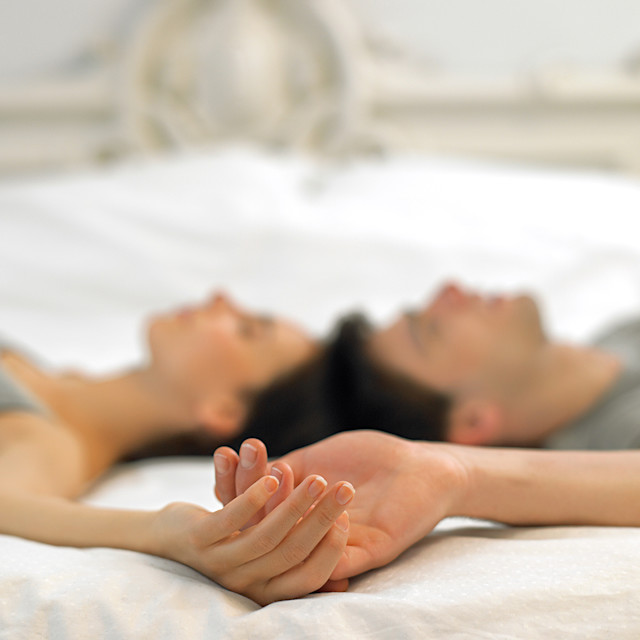Your sex can have a big influence on your sleep habits.
Your circadian rhythm, also known as your wake-sleep cycle, is controlled by the body’s 24-hour internal clock, and it’s an important component of your health. But sometimes, your circadian rhythm can cause problems for your ZZZs.
“When a person’s actual sleep schedule is not synchronized with their circadian rhythm, it can cause sleep disruptions, daytime sleepiness, and other health problems,” says Raj Dasgupta, M.D., a pulmonary, critical care, and sleep medicine specialist and the chief medical advisor for Sleepopolis. At least 800,000 individuals in the U.S. deal with circadian rhythm sleep-wake issues. While most experts recommend seven to nine hours of shut-eye a night, a healthy sleep practice may not be as simple as that — especially because there is a sex divide when it comes to sleep-wake cycles.
Studies suggest that women actually may need more sleep, though the science is out on exactly why. Most docs are still sticking to the established sleep duration recommendation, but many acknowledge that sex can play a pivotal role in sleep. “Although men and women require the same amount of sleep, women are more likely to experience insomnia or be sleep deprived,” says Dr. Raj. Men, on the other hand, are more likely to deal with issues like snoring and obstructive sleep apnea.
And that’s just the start of how women and men differ when it comes to sleep. “Women tend to have a shorter intrinsic period, leading to earlier sleep-wake preferences,” says Dr. Raj. Meaning early to bed, early to rise isn’t just a saying — it’s how most women’s bodies operate.
“Women are typically on an earlier circadian cycle — meaning they benefit from earlier-to-bed and earlier-to-rise [routines],” adds Annabel Abbs-Streets, author of “Sleepless: Unleashing the Subversive Power of the Night Self.” Generally, women would benefit from going to bed earlier, but many can’t due to their schedules and responsibilities or, of course, stress. “Being constantly told how much to sleep, or that sleep deprivation will give us dementia, or that we should track our sleep really adds to the burden of stress on women — many of whom have to get up at night to care for babies, children, or elderly relatives,” says Abbs-Streets.
Though women are typically more likely to be morning people, there’s both nature and nurture at play here again; biological factors such as melatonin production and core body temperature affect wake-up times, and social and cultural factors, like childcare responsibilities, further influence circadian rhythms, says Dr. Raj. “Hormonal fluctuations throughout the menstrual cycle and shorter circadian rhythms can disrupt women’s sleep patterns,” he says. “And again, childcare responsibilities, increased stress and anxiety, and higher sleep medication use further contribute to sleep issues in women.” Addressing these disparities necessitates a holistic approach that “acknowledges both biological predispositions and societal expectations,” he adds.
So what can be done to support both men’s and women’s sleep needs? A change in societal expectations, as well as work norms. “Traditional nine-to-five work schedules, childcare responsibilities, and household duties also often fall disproportionately on women, further disrupting their sleep patterns and making it challenging to stick to an individualized sleep schedule,” says Dr. Raj.
Those societal shifts may be a ways off, but there are some small ways to support your sleep-wake cycle. Women can aim to go to sleep earlier and understand that their hormones and menstrual cycles can (and do) affect sleep. “Fluctuations in hormones, such as during the menstrual cycle, can worsen circadian rhythm disturbances, leading to sleep issues, fatigue, and mood changes,” says Dr. Raj. And keep the lights low. “Women really need darkness at night and very low light in the evening,” says Abbs-Streets.
Likewise, men should understand that they run on a 24-hour hormone cycle, which means consistent sleep may be easier for them. However, they’re more likely to be affected by obstructive sleep apnea and snoring. They’re also more likely to suffer from shift work sleep disorder, which can affect people who work nontraditional hours and manifests with issues falling asleep, staying asleep, and overall sleepiness.
“By knowing that we’re different, that we have different sleep needs, that light (particularly blue light from LED bulbs) is especially detrimental to women, that we may benefit from different schedules, [we can better support each other],” says Abbs-Streets.
Dr. Raj suggests both women and men practice basic sleep hygiene: Keep to a regular sleep schedule, create a relaxing bedtime routine, maintain a conducive sleep environment, and avoid caffeine and alcohol before bed. It’s also smart to engage in regular exercise, manage stress and anxiety, and speak with a healthcare provider or sleep specialist if you are routinely having issues with sleep.
“Whether the sleep issues are manifesting themselves in a man or woman, the one thing that remains the same is how important sleep is to proper functioning and health for both men and women,” says Dr. Raj. “Both men and women need to take sleep quantity, quality, and regularity seriously.”
